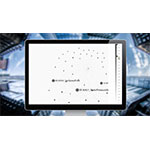BuildingIQ Epiphany Reveals Interdependent Data Relationships for AI-Driven System Optimization
Powerful inference engine creates virtualized network of disparate data points within systems
SAN MATEO, Calif.–(BUSINESS WIRE)–BuildingIQ (ASX: BIQ) has accelerated its leadership in artificial intelligence (AI) solutions with Epiphany – an AI-driven engine that uncovers how data is interconnected, dependent and influenced within a system. Epiphany is used to create foundational knowledge about a system that can enable insights like root cause analysis of anomalies; predictive failure and maintenance of equipment; better capital planning; and prioritization of service based on the real, hidden impact of issues versus simplistic cost-to-replace estimates.
Inferences derived from Epiphany are today powering BuildingIQ’s Outcome-based Fault Detection (OFD) service, bringing deeper anomaly detection and more valuable insights to fault detection within a building. With the introduction of the Epiphany full suite of tools, BuildingIQ can create a virtualized network of a system that brings an even more holistic view of system interactions among myriad data points and assets, regardless of how they are wired or logically connected.
“The problem with the IoT is that in practical terms, it’s a free-for-all in stand-alone devices and sub-systems. Using Epiphany, BuildingIQ is able to map how those devices and sub-systems are interdependent – creating a virtual network that shows how data and assets are connected in chains of influence,” said Steve Nguyen, vice president of products for BuildingIQ. “These virtual networks are manageable as if they were one network, making them able to be optimized for performance and tuned to the outcomes that best suit the needs of the operators and end-users. The creation of a virtual network is key to leveraging how IoT devices interact with each other and existing systems, such as building automation systems.”
The four components of Epiphany as initially applied to building systems are:
-
Influence Engine
- Reveals the impact of all points relative to whole building power, inferring what is driving a building’s energy consumption.
-
Influence Delta
- Examines how an influence changes over time, looking at associated power impact from equipment due to that change.
-
Delta T
- Correlates real energy impacts with comfort impacts, allowing facilities teams to prioritize work better than with simple rule violation faults.
-
Correlation Map
- Uses machine learning to create a map of the relationships between points, quickly inferring root cause through powerful filtering capabilities.
“We are applying this first generation of Epiphany to gain a better understanding of the buildings that we serve. Epiphany is helping us develop new value around knowledge management and risk reduction, giving us strategic tools to go deeper and wider throughout operations and into areas like predictive maintenance for financial planning,” said BuildingIQ CEO Michael Nark. “But Epiphany is not only a building-specific tool set; it can apply to other processes and systems doing device-level analytics, and we can take our expertise in complicated building scenarios and apply it outside the current market.”
For more information about Epiphany, watch the video at: https://youtu.be/ktXans2qHj4.
About BuildingIQ
BuildingIQ (ASX: BIQ) helps building owners and operators worldwide lower energy use, increase building operations efficiency and enhance tenant comfort. The Company’s 5i cloud-based platform and Managed Services deliver on the promise of Internet of Things (IoT) for buildings with none of the drawbacks. Over 130M square feet of building space is currently under management with BuildingIQ. www.buildingiq.com
Contacts
Christine Bennett
BuildingIQ
[email protected]
This article published with permission from Business Wire

